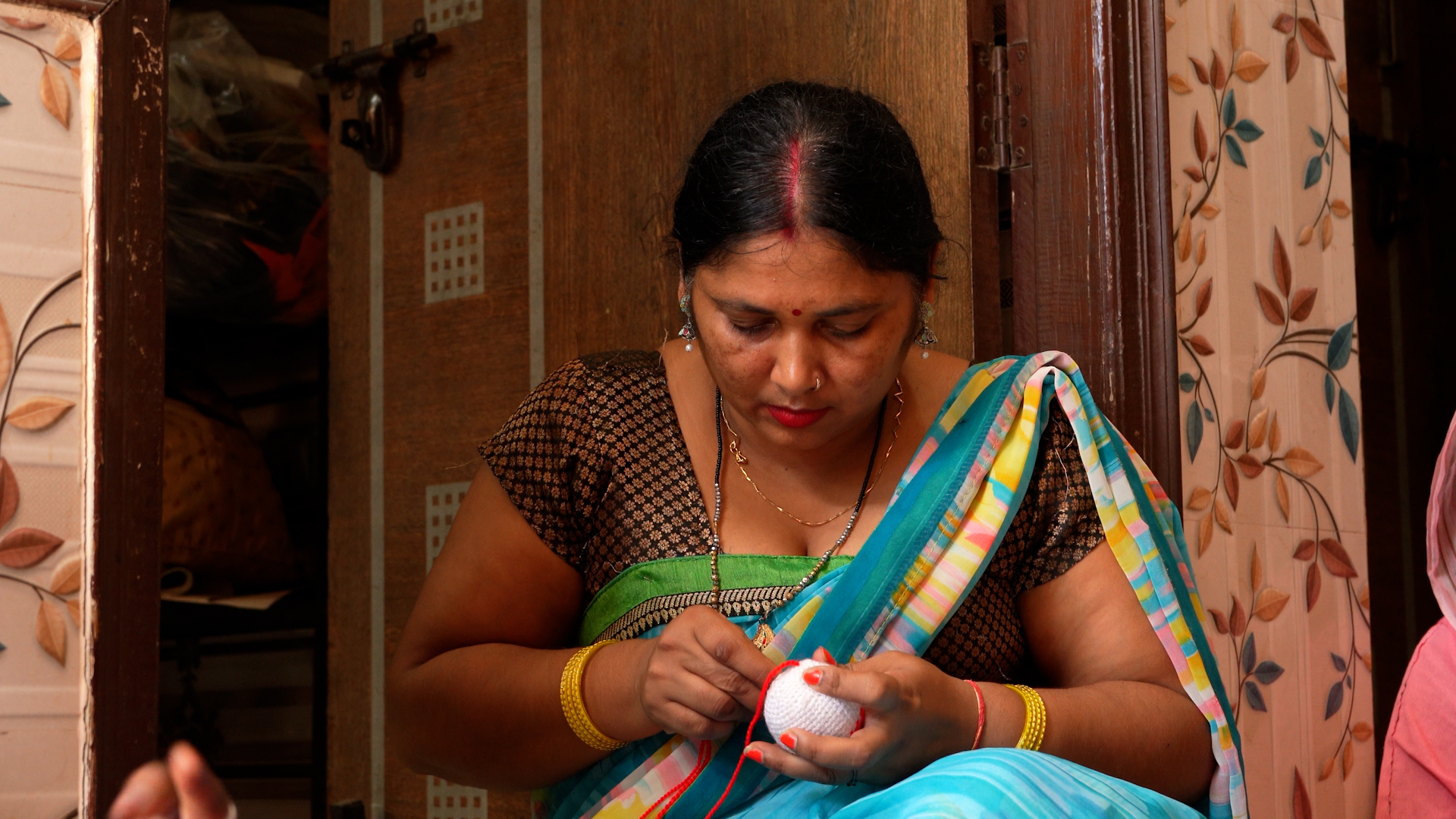
FOR KIDS: Poonam making toys using the recycled cotton
“Now I don’t need to ask my husband for trivial expenses. Right now, whatever we earn from this, we use it for our household expenses. Else we spend it on our children or for buying groceries,” says a joyful Poonam while filling cotton in the soft toys.
Poonam, a 30-year-old housewife, living in the Nangli village of Noida, spends her afternoons making soft toys from recycled cotton.
Her evenings are mostly spent making paper bags from recycled paper.
The cotton and paper she is using is not ordinary, but recycled from cigarette butts. Yes, the same cigarette butts which a lot of us just casually throw after smoking.
Smoking is injurious to health! Well, this is one of the most popular social campaigns for reducing consumption of cigarettes across the world. But have you ever wondered about cigarette waste? Where exactly do these cigarette butts go?
In India, during the year 2021-22, approximately 113 billion cigarette sticks were produced and more than 100 billion cigarette butts were disposed of unscientifically into the environment, as per Central Pollution Control Board (CPCB).
Most of this waste either ends up at the landfill or goes into the drain. Cigarette butts are one of the most common waste materials found during beach clean-up.
Noida-based entrepreneur Naman Gupta is determined to rid our streets and beaches of cigarette waste.
In 2018, Gupta launched Code Effort, an enterprise with a clear objective: to put an end to the problem of cigarette waste.
“When I saw lots of cigarette waste on the roadside, everywhere around the city, I realised that there is a gap in terms of the waste disposal and management of cigarette butts,” says Naman Gupta, on how the idea of managing cigarette waste came about.
The 32-year-old co-founder started by understanding cigarettes, their composition and waste management.
“I don’t smoke cigarettes. But like everyone, I also used to think that the cigarette butts and the filters are made out of cotton,” says Gupta.
“However, after initial research and study I got to know how toxic they are for the environment.”
As per CPCB, these butts are made of synthetic polymer called Cellulose Acetate, which is toxic and a slow/non-biodegradable plastic.
Many studies suggest that it takes 10-12 years for a cigarette butt to biodegrade.
“Because it is made out of a fibre, so while degrading it breaks down into microplastics and nanoplastics which enter and pollute our ecosystem and aquifers on a massive scale,” explains Gupta.
To make the city free of cigarette waste, initially Code Effort started by picking and procuring cigarette waste. The Noida based company collects cigarette waste through its special bins (known as a receptacle or a cigarette bin) installed in bars and restaurants, and also through a network of rag pickers across India.
“We started approaching waste-pickers, cigarette shops and commercial spaces so that we can create a sense of responsibility and potentially procure these cigarette butts. We wanted to provide a disposal option to all these stakeholders,” adds Gupta.
The enterprise, which started in 2018, has spread across India over the last five years with a network of over 200 waste pickers.
“When we started in 2018, we were procuring around 10 to 15 grams per day. But currently we are dealing with around 1500 kg per day. So far, in the 2022-23 financial year, we have recycled more than 200 crore cigarette butts,” says Gupta on waste procurement.
However, Gupta says cigarette butts waste is still a big challenge and procurement is just one part of the process.
The procured cigarettes are recycled using proprietary processes involving chemical bleaching in their Noida based facility.
A cigarette butt usually has three components, the filter made of fibre, a paper covering the filter and residual tobacco.
“Using our proprietary process, we segregate, clean and convert the fibre into stuffing for soft toys. We have employed over 100 women from the nearby village to make soft toys using this cotton,” says Gupta.
The second component, the paper covering, generally brown or white in colour, is biodegradable. However, it also goes through chemical compositions (including insecticides and pesticides) to reduce its burning effect and give flavour.
The enterprise recycles this paper to make stationery items like paper and mosquito repellents.
“The leftover tobacco and ash act as a natural fertiliser, which we convert into compost powder and send it to the nearby gardens and nurseries,” adds Gupta.
Hence, we are able to completely recycle cigarettes into different sustainable products.
The enterprise manages to recycle waste into sustainable products, while providing employment to local enterprising women.
“Monthly, I am able to earn Rs 9-10,000,” says Poonam.
“I have been working with Code Effort for the past 4 years. I am very happy with my work. Recycling cigarettes keeps our environment clean.”
Delhi hosted what organisers describe as the world’s first player auction in golf, launching ‘72…
An elderly woman recalls how her six-year-old granddaughter lay bleeding after a speeding car hit…
Municipal Corporation of Delhi plans a unified policy enabling RWAs to adopt and maintain parks…
A 17-year-old boy allegedly died by suicide after jumping before a moving train at Uttam…
Delhi High Court grants bail to 26-year-old Thar driver accused of mowing down two in…
Two Rohini men arrested for fatally stabbing one person and injuring another during a robbery…